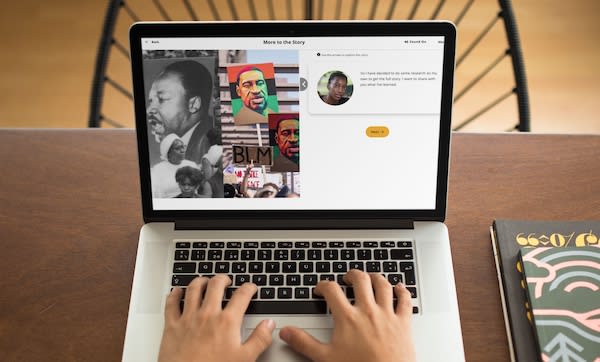Lessons On Entrepreneurship From Black American History
When I reach back into the depths of my memory, I’m staring up at a larger-than-life map of the earth. Before I had ever heard the term “accent wall,” I was captivated by this visual wonder that sat opposite my grandfather’s clunky wooden desk. My grubby little fingers run along the deep greens and sprawling blues of the wallpaper until I find the seam that I know better than to pick at. Knowing temptation will soon get the best of me, I scamper to my grandmother’s office across the entry hall of the business they built together and run as a team. She has a typewriter in there that is much more fun and far more durable than the wallpaper.
I look back on this memory and others like it with pride. So much of my childhood was spent watching my two favorite people do the delicate dance of entrepreneurship. Building and rebuilding the budget, careful hiring decisions based on forecasting, seemingly endless phone calls with customers (this was pre-email!), and eventually a big decision to move to a bigger office. As any business owner will lament, it wasn’t always smooth sailing. There are tough lessons learned and sometimes the cards, regulations, and finances are all stacked against you.
It was a true privilege to have these lessons on entrepreneurship, business, and income firsthand as I wandered their offices, and I believe it is important to expose students of all backgrounds to these lessons. As we head into April, I am sharing some lesson ideas with anyone looking to explore business and finance in more detail.
My Favorite Famous Black Entrepreneurs in History
All students will come up against obstacles in life, especially if they want to run their own business. Black business people have endured many challenges and setbacks in their pursuit of economic advancement. For many students, hearing about the challenges that black entrepreneurs have overcome will inspire them to invest more in their own future.
- C.C. Spaulding: Spaulding became president of the North Carolina Mutual Life Insurance Co., the largest Black-owned insurance company in the nation. At the time of his death, the company was the country’s largest Black-owned business, valued at $40 million.
- Maggie Lenna Walker: Walker was the first Black woman to become president of a bank in the United States. St. Luke’s Penny Savings Bank in Richmond, Virginia, held assets totaling $530,000 in 1920—equal to about $7 million today. Walker employed more than a hundred Black women in a once-unthinkable career field.
- John L. Webb: Webb was a well-known contractor in the south. He was responsible for building prestigious buildings, including the Woodmen of the Union Building in Hot Springs, Arkansas, a $500,000 build in 1924.
Granting students access to the stories of Black business titans, entrepreneurship, and income for Financial Literacy Month just takes a few simple steps: Set up your free EVERFI teacher account and select “306: Black History” from the drop-down. Click “Catalog” to add additional financial literacy resources relevant to your grade level, then click “Create Class” on your Home screen to share the lessons with students.
More Free Entrepreneurship Lessons for Grades 6-12
- Grades 7-10, Venture: Entrepreneurial Expedition
- Who doesn’t love a food truck? Students build their own business, from securing startup capital to hiring a team and exploring growth opportunities. The scenario-based lessons allow students to see what it takes to be their own boss and inspire them to prepare for their future.
- Grades 9-12, Marketplaces: Investing Basics
- Making building wealth attainable by demystifying the marketplace. Here students will explore the basics of investing and how the individuals, businesses, and government come together to make it all work. Students will walk with a business owner through the process of taking a startup to IPO and all that entails.
- Grades 6-12, FutureSmart or EVERFI: Financial Literacy
- Savings accounts and interest. Income and career decisions. Credit and insurance. These lessons give students the basic tools they need to be financially literate in both their personal and business lives. FutureSmart is for 6-8th grade and EVERFI: Financial Literacy is for 9-12th.

